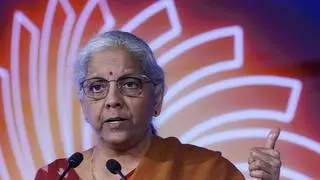Micro, small and medium enterprises (MSMEs) are facing existential crisis, with revenue expected to fall by a fifth, as the Indian economy is projected to contract 5 per cent in FY2021 due the Covid-19 pandemic, according to credit rating agency Crisil.
The contraction in the economy will significantly hurt MSMEs across sectors, it added.
According to Crisil’s analysis, the pain will worsen as India Inc heads towards about 15 per cent decline in revenue and about 25 per cent fall in earnings before interest, taxes, depreciation and amortisation (Ebitda).
For MSMEs, the agency assessed that the fall in revenue will be steeper at 17-21 per cent, while Ebitda margin will shrink 200-300 basis points to 4-5 per cent as weak demand gnaws away gains from lower commodity prices.
Crisil observed that a sharp decline at the operating level will also impact creditworthiness, aggravating the liquidity woes these units have been grappling with, particularly on the working capital front.
As a result, average interest service coverage ratio could slide to 1-1.5 times from 2.4 times seen between fiscals 2017 and 2020, even after factoring in the benefit of moratorium on interest payments announced by the Reserve Bank of India (RBI). Sans moratorium, the ratio would have gone below 1.
Material stress
Crisil, in a statement, said the challenges would be the hardest for micro enterprises, which account for 32 per cent of the overall MSME debt, and are facing material stress in terms of revenue growth, Ebitda margins and working capital stretch.
Previous downturns have shown that unlike medium and larger firms, MSMEs are unable to manage transient working capital challenges.
To that extent, the agency said the measures announced by the Finance Ministry and the RBI, nudging banks and other institutions to lend more, will help them tide over tapered cash flows.
Demand: Bigger issue
Crisil underscored that the bigger issue, however, is demand, which needs to revive for growth to improve sustainably.
Amish Mehta, Chief Operating Officer, Crisil, said: “The current facilitations may not have the heft to crank up demand in the near term because fiscal stimulus is limited and only to vulnerable households.
“It is critical that the demand curve is yanked steeply northwards, especially in discretionary products and services.”
3-pronged strategy
Mehta suggested that a three-pronged strategy is essential now: one, improve the sentiment around job security for formal and informal workers to boost consumption. Two, hasten implementation of the ₹3 lakh-crore Aatmanirbhar scheme to ensure flow of liquidity to MSMEs continues.
Three, and most importantly, lenders must go beyond traditional credit processes because they have to play a seminal role in recovery. Mehta said that will mean closer interactions with MSMEs to understand underlying drivers of business, and using innovations such as operational scorecards, digital platforms and alternative data for monitoring and underwriting.
As for sectors, Crisil sees consumer discretionary, construction, and export-linked ones bearing the brunt. Small real-estate contractors into EPC (engineering, procurement, construction) projects, and ceramics and textiles makers have been significantly impacted so their credit profiles are the most vulnerable.
The agency said revenue growth of MSMEs in the real EPC segment could almost halve with demand sliding even as rising costs, supply chain disruptions and labour issues exert severe pressure on margins.
Lower utilisation and partial absorption of BS-VI price hike could erode margins of auto-component MSMEs this fiscal despite lower raw material prices.








Comments
Comments have to be in English, and in full sentences. They cannot be abusive or personal. Please abide by our community guidelines for posting your comments.
We have migrated to a new commenting platform. If you are already a registered user of TheHindu Businessline and logged in, you may continue to engage with our articles. If you do not have an account please register and login to post comments. Users can access their older comments by logging into their accounts on Vuukle.